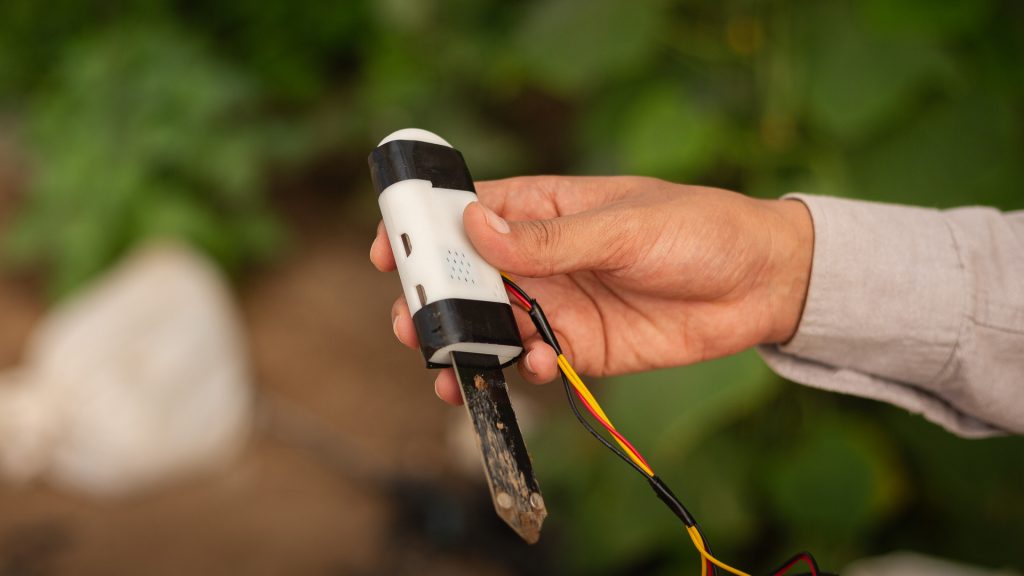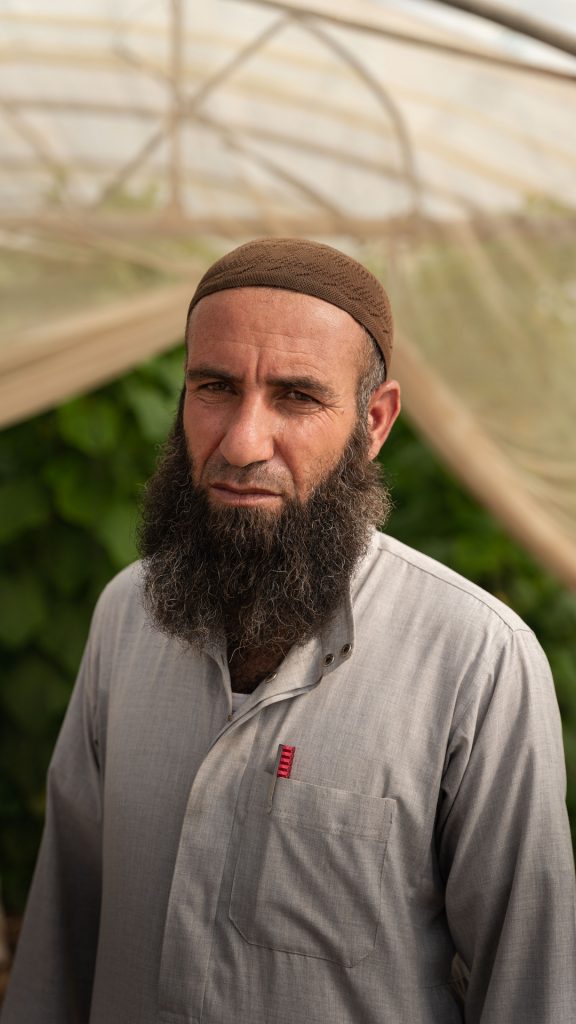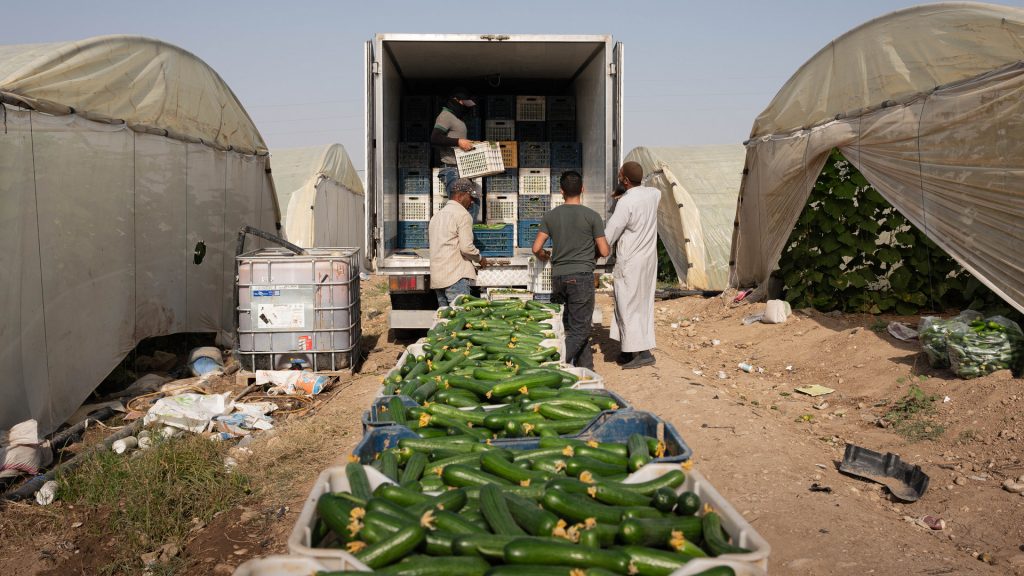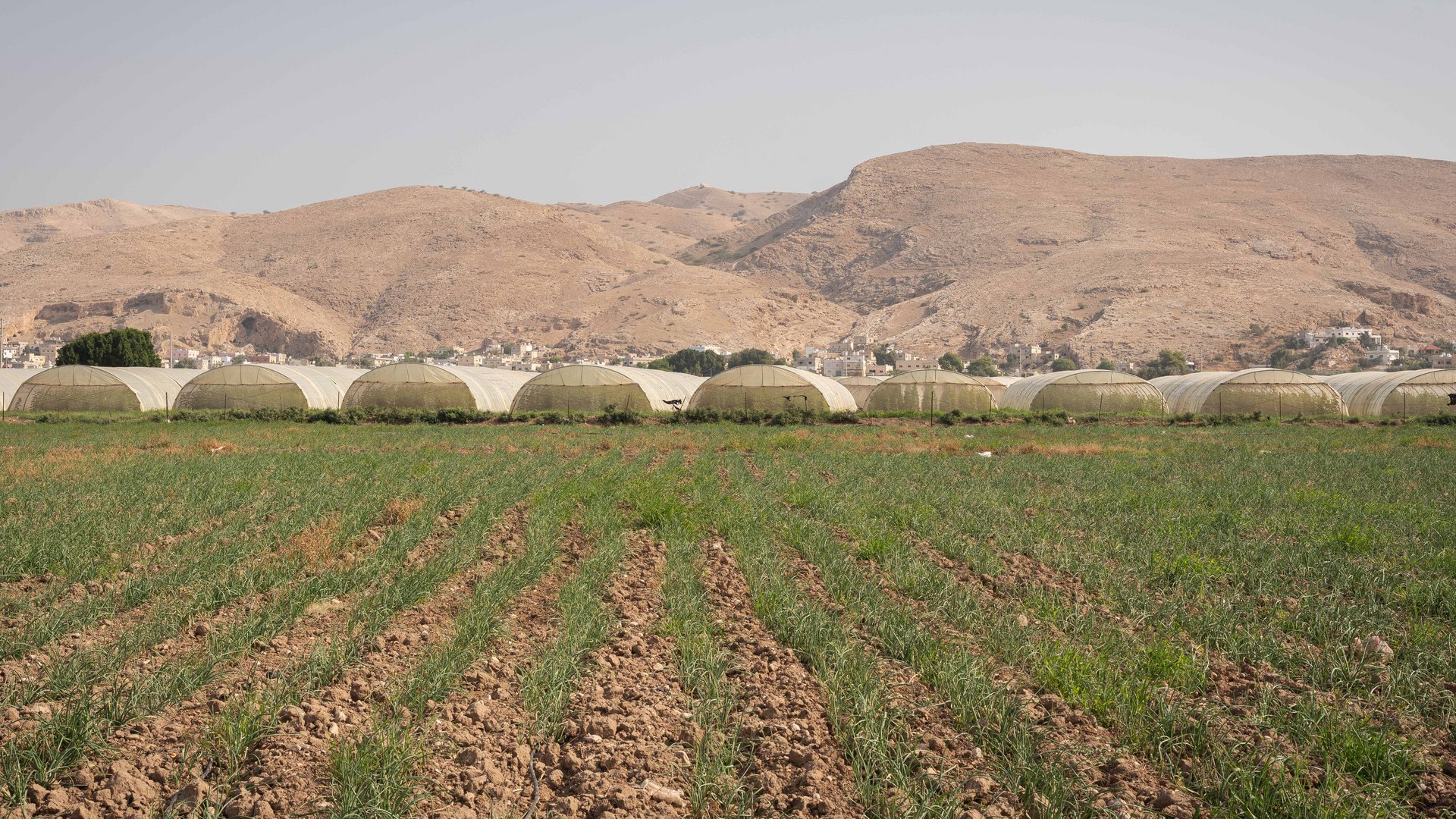“In the future I’ll be measuring instead of guessing” – A tech innovation by a young Jordanian helps farmers increase crop yields
Sager Marayha, 28, developed a device he hopes will boost the most important trade in his birthplace – farming. FCA supports the young agricultural engineer with a grant to start production.
THE AIR FEELS thick and there are flies buzzing around. In early November, Jordan is preparing for winter; but in the sheltered Jordan Valley, west of the country, summery conditions continue.
The greenhouses are brimming with foliage. Between them, cucumbers are loaded onto a truck that’ll soon begin its journey to the capital Amman. There, the cucumbers will be pickled and then sold to be served in local restaurants.
Sager Marayha, 28, stands in the scorching sun and fiddles with a tiny plastic bag. Inside it, there’s something that can reduce farmers’ workload and improve crops in the future.
“This is the prototype, like a small computer with several sensors,” Marahaya says, digging into his bag.
“This sensor measures soil temperature, this one assesses humidity, this one acidity and salinity.”

Marayha demonstrates how the innovation works. First, it’s thrusted into the soil, and soon, the farmer will receive information regarding the properties of the soil on a smartphone app. A new result will appear on the screen every five seconds.
“The farmers in the Jordan Valley use fertilisers and water without knowing exactly what the farmland actually needs. It’s possible that the soil is so rich in nutrients already that it’s impossible to grow anything anymore. The device will help reduce the unnecessary use of fertilisers and watering just in case.”
As a teenager, Marayha already worked in the fields and greenhouses. The community encouraged him to continue his studies at a university. Marayha became the first in his family to have a higher education.
During his studies, Marayha got to know different kinds of agricultural measuring instruments and wondered why they all seemed so complex and clumsy. Could a small and easy-to-use alternative provide all that information in one go?
A cucumber farmer is ready to invest in smart tech
The practical experience from the field and the knowledge from university helped Marayha get started with developing the device. Soon the technology began to garner the interest of not only farmers and the media but also researchers.
“The problem is that Jordanian agriculture doesn’t really attract investors,” Marayha points out.
The young agricultural engineer was given support from a joint project of Finn Church Aid and the foreign ministry of the Netherlands. The project trains young agricultural professionals to ensure the industry continues to attract future workforce. After proving his commitment and willingness to develop, Marayha was given a grant he can use to begin the production of the devices and selling them to farmers.

There are plenty of potential buyers. Cucumber farmer Abu Muhammad has a total of a hundred cucumber tunnels in Jordan, and in three months, a single tunnel produces 7000 to 7500 kilos of crop.
According to Marayha, a 500-square metre tunnel can be covered with three devices. Manufacturing one device costs approximately 65 euros, but it hasn’t got a market price yet. Even so, the farmer is ready to invest in the innovation.
“The price doesn’t concern me, and I don’t care about it. I’m sure the benefits will outweigh the price,” Abu Muhammad says.
He’s confident that the device will be particularly useful during sowing.
“Sometimes I fertilise wrong and end up losing both the money spent on fertilisers and the crop. In the future my farming will be based on scientific measuring instead of guessing.”
Making a living as a farmer isn’t easy. The biggest reason, Abu Muhammad says, is that there’s no fixed market price for crops in Jordan.
“As we’re farming, we don’t know for what price we’ll be able to sell. Many have quit, and most people have started to cultivate various plant species to mitigate the risk. I’m taking a significant risk with all these tons of cucumber. I get along, because I have a contract for getting them pickled. If all my cucumbers were sold in the fresh market, the profit would be uncertain.”
Farming is badly lacking young professionals
The situation in the rest of the world also poses a challenge for Jordan’s farmers. The crops no longer travel to dinner tables around the world like they used to.
“We used to farm a lot to meet the needs in Syria, and through Syria, our products would go to Turkey and from there to Russia. Because of the war in our neighbouring country, the trade route has been closed. Previously we also sold to the Gulf countries, but now they have their own farms,” says Abu Muhammad.

Abu Muhammad says he’s constantly on a razor’s edge due to the fluctuating markets.
“I only have to fail once. If I can’t sell my next crop, I’ll give up farming.”
At worst, the consequences to food production can be dramatic. If one farmer after another quits their profession and the young aren’t drawn to it, Jordan might have to start importing more food in the future. The cucumber farmer has faith in young professionals who otherwise have no work opportunities in the region.
“It’s great that Marayha and other young people are developing agriculture. Everyone wins: the farmers benefit from the innovations and the young get more work opportunities. Marayha has a university degree, and the studies have cost a fortune, and currently he hasn’t got anything else to do for work. It’s up to us farmers to encourage the young to make a living for themselves,” Abu Muhammad ponders.
Marayha says that his education as well as the grant he received improve the financial situation of his family. The young man wishes that with the help of his future income, his hard-working mother could finally get some rest.
“I dream about my future every day. I have already received inquiries from people who could help me sell the device abroad. My dream is to see the device in use specifically in Jordan, so it could benefit the people in my own region.”
The Cool-Ya project is funded by the Kingdom of the Netherlands. The project is seeking to attract more youth to the agriculture sector by making it more appealing and interesting for the young people.
Text: Ulriikka Myöhänen
Translation: Anne Salomäki
Photos: Sherbel Dissi
